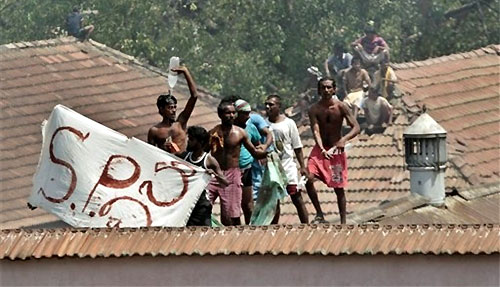|
Social Justice vital for a new Lanka
Daily Mirror Editorial Jan 25, 2011 | |
 The ongoing crisis in Nigeria where the country was crippled by general strikes over the withdrawal of the fuel subsidy and violent religious clashes has some important lessons for Sri Lanka. Nigeria earns more than 200 million dollars a day on fuel exports but tragically more than forty per cent of its people are known to be earning less than two dollars a day and thus languishing below the poverty line in different degrees of degradation and destitution. What is happening in that country is that largely through corrupt practices, the rich are becoming richer and the poor poorer while the gap between them is reaching monstrous and explosive proportions. The situation in Sri Lanka is similar and public reaction to various crises during the past few months indicates there might be a major uprising and massive street protests if fuel prices are doubled as in Nigeria. The unprecedented agitation in the universities and regular public protests over various issues including the Welikada Prison riot yesterday are indications that despite all the political proclamations about becoming the wonder of Asia, Sri Lanka may be sitting on a volcano because millions of people are struggling on or below the poverty line. Recently the Bangladeshi Nobel Peace Prize laureate Mohamed Yunus of Grameen-bank fame was in Sri Lanka to speak to top business personnel and political leaders on what he described as social business. For decades the Grameen Banks have been giving interestfree loans to poverty-trapped people to encourage them to go into various forms of self-employment so that they could earn their living and restore their dignity as human beings instead of surviving as parasites or paupers on the dole. Broadening the concept the Nobel Peace Prize winner has with the cooperation of the Government and private entrepreneurs helped the poor to develop their selfemployment projects to such an extent that instead of being job seekers they become job givers. We need to remember that whatever the statistics or damn lies about growth rates and the gross domestic product, hunger is the biggest killer and poverty the most widespread disease. Therefore until we effectively bring about poverty alleviation and social justice by reducing the gap between the rich and the poor, we cannot build a solid foundation for sustainable economic development. For this to happen, we need a change of attitude at the top -- a paradigm shift among political and other leaders. They need to realise the vital importance of entering into a simple and humble lifestyle or Alpechchathawaya – one of the corner stones of our hallowed ancient civilization. Political and other leaders need to set an example by learning to manage with basic needs instead of desiring luxury lifestyles or indulging in vulgar extravagance such as regular five-star bust-ups or expensive pleasure cruises abroad at public expense. If political and other leaders enter into a simple lifestyle as leaders like Mahatma Gandhi did, Sri Lanka could save millions of rupees and the money saved could be shared to gradually reduce the poverty gap. For instance if the huge amount spent on security is reduced, the Government could allocate much more money for vital areas such as healthcare, education and environmental protection so that a healthier, well educated and happier people could play a bigger role in building a better Sri Lanka where we have multi-racial and multi-religious unity in diversity. Source: Daily Mirror - Sri Lanka
|
|